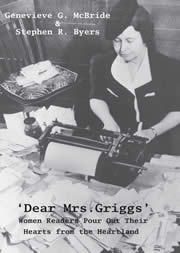Marquette University Press is pleased to announce the inauguration of a new book series from the Diederich College of Communication entitled Diederich Studies in Communication and Media.
The editor of the series is DR. BONNIE S. BRENNEN, Nieman Professor of Journalism, in the Department of Journalism
The fourth book in the series is
‘Dear Mrs. Griggs’: Women Pour Out Their Hearts from the Heartland
by Genevieve G. McBride & Steven R. Byers. ISBN 978-0-87462-038-2.
370 pp. 5.5 x 8.5 Paperback. List price $29. Illustrated. Notes. Bibliography. Index.
Before “Dear Abby” or “Ann Landers,” an advice columnist beloved as “Dear Mrs. Griggs” already had dispensed wisdom to millions of readers, mainly women, for decades. Indeed, Ione Quinby Griggs became legendary, as she set a record for longevity of more than half a century in the “advice industry,” because she colluded with her readers in the column, empowering them to set the agenda of their page, the back page of the newspaper. The result often foreshadowed front-page news, as their collaborative effort created a forerunner of modern social media, for a more “sociable media.” A form of community forum, the column provides a literal mother lode for research into her readers’ letters on their daily lives and everyday concerns, in their own and often colorful words. The result is a unique social history of a region, a class, and a gender rarely represented in histories: Generations of Midwestern women in a working-class city, as well as in surrounding rural areas soon to become suburbs, where daily reading of “Dear Mrs. Griggs” became one of the continuities in their lives, amid major societal change for more than half a century in the mid-twentieth century.
If they rarely made news on the front page, her readers found on the back page of the newspaper a forum for discussion of conflicts and controversies as well as continuities in their lives, which made their page the best-read page of the Milwaukee Journal. From the depths of the Depression of the 1930s into new workplaces for women on the World War II homefront in the 1940s, from urban ethnic enclaves to homes of their own in new postwar suburbs with “spiked kaffeeklatsches” in the 1950s, from the era of the modern women’s movement and many momentous social movements in the 1960s and 1970s, into the “conservative revolution” of the 1980s, faithful readers of “Dear Mrs. Griggs” from across the Heartland penned often heartfelt and sometimes hilarious letters on their issues, in their times.
And if, at times, some letters seemed likely to be hoaxes, the bane of newspapering, readers today again may agree with “Dear Mrs. Griggs” and her millions of readers in their many reasons to turn daily for decades to the back page of the paper, where their column ran next to the “funnies,” local terminology for their comics and cartoons. All contributions to the column could be revealing of her readers, as the columnist knew. However, she had another reason, which was revealing of her own wisdom and wit in replies to readers that also contributed to their column’s remarkable run. Queried on one questionable letter, Ione Quinby Griggs replied: “What's the harm in having a little fun?”
More here: dearmrsgriggs.weebly.com






